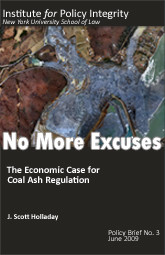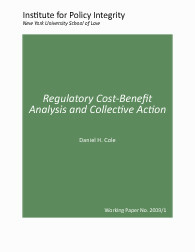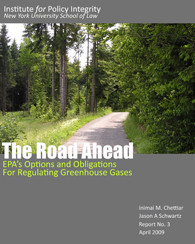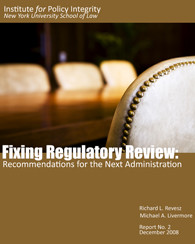The Institute for Policy Integrity produces a variety of publications. Our research reports develop in-depth research on our core issues, while our policy briefs and issue briefs provide focused analysis on more timely or particular topics. Our academic articles and working papers offer original scholarly research and analysis from established experts as well as fresh new voices.
Latest Publications
-

No More Excuses
The Economic Case for Coal Ash Regulation
No More Excuses: The Economic Case for Coal Ash Regulation is a brief but careful analysis which reveals several compelling findings on the regulation of the toxic by-product of coal combustion. In broad strokes, it is clear that the benefits of regulating coal ash storage facilities would far outweigh the costs. The benefits of a regulation requiring coal ash to be stored in dry conditions and in synthetically-lined, covered facilities could save tens or even hundreds of millions of dollars per storage facility.
-

Regulatory Cost-Benefit Analysis and Collective Action
In Regulatory Cost-Benefit Analysis and Collective Action, Daniel H. Cole describes the influence of cost-benefit analysis and explains how and why it is a politically useful tools for agencies, even when those agencies are not required by law to prepare regulatory cost-benefit analyses (RCBA). As Cole says in his introduction, “For better or for worse, RCBAs have significantly influenced policies for dealing with, or not dealing with, collective action problems ranging from airport enlargement to global climate change.”
-
_110_170_90.jpg)
Federalism Accountability
“Agency Forcing” Measures
In Federalism Accountability: “Agency Forcing” Measures, author Catherine M. Sharkey advocates a variety of “agency-forcing” measures designed to enhance the ability of Congress, the executive, and especially the courts to ensure that agencies abide by executive mandates and other reforms, and to provide a check on overt politicization or inaction on agencies’ part.
-

The Road Ahead
EPA’s Options and Obligations for Regulating Greenhouse Gases
This detailed legal analysis provides an in-depth and thorough discussion of greenhouse gas regulation under the Clean Air Act answering the questions: What are EPA’s obligations under the Clean Air Act, and how far can and should the agency go to regulate greenhouse gases?
-

Fixing Regulatory Review
Recommendations for the Next Administration
Fixing Regulatory Review: Recommendations for the Next Administration provides a set of recommendations for the Obama Administration to improve the process of regulatory review. It includes ten principles that should inform regulatory review and cost-benefit analysis of regulation, as well as a detailed markup of the Executive Order signed by President William Jefferson Clinton that established the structure of review that is currently in place.
